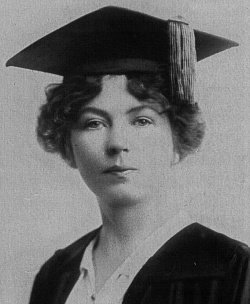39 Gender Parity (or lack thereof) in Canadian Electoral Politics, I
Women's issues - or, for that matter, gender oppression - have hardly registered on the election campaign radar, report Andrea D'Sylva and Linda Christiansen-Ruffman of rabble.ca:
During Monday's debate, New Democrat leader Jack Layton argued that the election of more women to parliament will change both the style and the substance of Canadian politics. In a rather self-congratulatory tone (mitigated only by the recognition that "we still have some way to go"), Layton reported that 37% of the NDP's candidates are women, and strongly intimated that if we want to "clean up" Canadian politics (get rid of the scrappy culture of question period, and teach those MPs some decorum) we'd better elect some of 'em. I'm all for gender parity in government (and, duh, universal suffrage) -- but the argument that electing women will somehow infuse politics with moral virtue is as old as Christabel Pankhurst.

Christabel Pankhurst
It may have been a strategically effective argument for suffragists to make in the nineteenth and early twentieth centuries, but it is just a plain old anachronism coming from the 'stachioed lips of Jack. Will electing more women to federal government change conditions for women? Maybe, if these women are feminists. Will it civilize the house of commons? Maybe, if these women are civil (but even then, probably not). In this day and age, is there a more wishy-washy liberal way to argue that women are under-represented in Canadian parliament than this? Hardly. This under-representation needs to be analyzed as forming part of a system of oppression, in which women are exploited, violated, and, by insidious as well as overt means, destroyed. Try: still earning 71 cents to the man's dollar; lack of access to abortion and basic health care in rural Canada; second-class, heteronormative immigration and residency laws that trap women in abusive domestic relationships; sexual assault rates showing no sign of diminishment; the rise in homelessness, poverty, and the corresponding deterioration of women's mental and physical health; eighty women missing from Vancouver's Downtown East Side; five hundred aboriginal women murdered or missing in the last thirty years... What might it mean to make these election issues? What would this take? Probably more than a few more good, upright women teaching manners to politicians -- and maybe manners are overrated, anyway.
"In the most recent House of Commons, women comprised only 21 per cent of the elected total. Currently, women make up 25 per cent of all party candidates, which does not augur well for change. This disparity in representation affects the way women's voices are heard and creates a serious imbalance in a theoretically equal society. Thus, candidates in this election must be made aware of concerns that matter to women: livable incomes, affordable housing, absence of violence, and the presence of quality, public services. These concerns not only matter, but they affect women's access to their basic human rights."
During Monday's debate, New Democrat leader Jack Layton argued that the election of more women to parliament will change both the style and the substance of Canadian politics. In a rather self-congratulatory tone (mitigated only by the recognition that "we still have some way to go"), Layton reported that 37% of the NDP's candidates are women, and strongly intimated that if we want to "clean up" Canadian politics (get rid of the scrappy culture of question period, and teach those MPs some decorum) we'd better elect some of 'em. I'm all for gender parity in government (and, duh, universal suffrage) -- but the argument that electing women will somehow infuse politics with moral virtue is as old as Christabel Pankhurst.

Christabel Pankhurst
It may have been a strategically effective argument for suffragists to make in the nineteenth and early twentieth centuries, but it is just a plain old anachronism coming from the 'stachioed lips of Jack. Will electing more women to federal government change conditions for women? Maybe, if these women are feminists. Will it civilize the house of commons? Maybe, if these women are civil (but even then, probably not). In this day and age, is there a more wishy-washy liberal way to argue that women are under-represented in Canadian parliament than this? Hardly. This under-representation needs to be analyzed as forming part of a system of oppression, in which women are exploited, violated, and, by insidious as well as overt means, destroyed. Try: still earning 71 cents to the man's dollar; lack of access to abortion and basic health care in rural Canada; second-class, heteronormative immigration and residency laws that trap women in abusive domestic relationships; sexual assault rates showing no sign of diminishment; the rise in homelessness, poverty, and the corresponding deterioration of women's mental and physical health; eighty women missing from Vancouver's Downtown East Side; five hundred aboriginal women murdered or missing in the last thirty years... What might it mean to make these election issues? What would this take? Probably more than a few more good, upright women teaching manners to politicians -- and maybe manners are overrated, anyway.
P.S. If you haven't already, you have to head over to and your little dog too to see the implicit logic of campaign signs teased out (with a little help from Illustrator) by Victor Serge! Worth a laugh.

0 Comments:
Post a Comment
<< Home